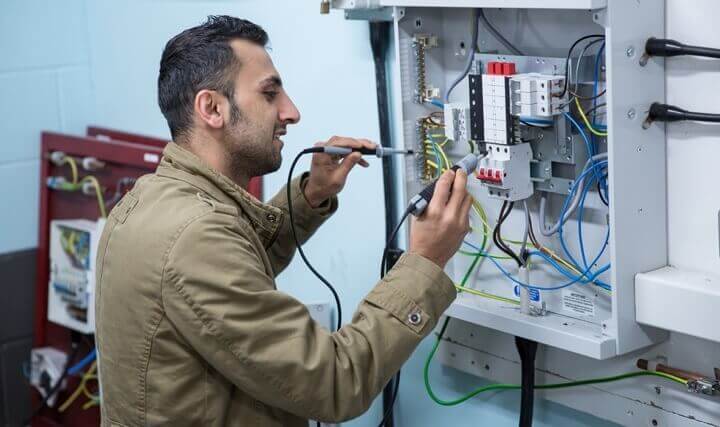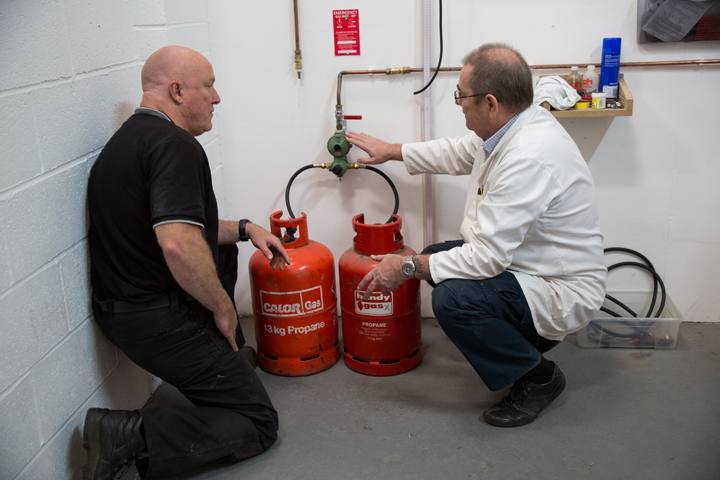If the office life isn’t for you because you prefer working with your hands and learning practical skills you should consider learning a trade skill. These skills are in high demand here in the UK due to a countywide skills shortage. Learning a trade skill can be fun and rewarding and you won’t need to spend years in University before starting your career. Here are more reasons why you should start training with Access Training Academies.

Gain these qualifications and learn the practical skills required with Access Training Academies.
Access Training intensive courses are built to suit you, whether you are a beginner wanting to learn a new skill, or a professional wanting to enhance your qualifications, there is a course to suit you.
If you'd like advice about any of the courses we offer we are more than happy to help. Feel free to contact us today.
The UK is currently suffering from a shortage of trade skills. As these trade skills are in such a high demand there has never been a better time to train. Working a manual trade is a rewarding career choice and you don’t have to spend years in University to start. Learn more about why you should qualify in a trade with Access Training from our trade infographic.

You can complete the necessary qualifications and these specialist courses with Access Training.
Choose from Essential, Professional and Premier intensive courses – something to suit everyone whether you are a beginner or just enhancing your skills!
Contact Access Training now to find out more about any of the course packages we offer.

Photo courtesy of pexels.com
So, you're sick of your current job and you want to make a change as soon as possible. You could simply apply for a role elsewhere, but what if it's not your present employer or workplace that you have a problem with? What if you're looking to switch to a different line of work entirely?
If that's the case, you'll often have to retrain and you can have the opportunity to do so by looking into our intensive trade courses. As we explained in our last blog post, What Are the Best Careers to Retrain For?, learning a new skill and becoming a professional tradesperson is a great career change option, but is it the right choice when you're specifically looking to make a QUICK career change? In other words...
Is it possible to become a qualified tradesperson in a short space of time?
The 'traditional' training route for plumbers, electricians and other tradespeople is unfortunately rather time-consuming. An apprenticeship takes several years to complete, meaning that you'll be stuck at the training stage for quite a while before starting your new career proper.
Fortunately, there are faster ways to get qualified. A good intensive / fast-track training course will cover everything you need to know (including all relevant theory knowledge as well as the practical skills you'll be using on the job) in a matter of months rather than years, making this a far better option for those looking for a fast career change.
Of course, successfully completing a fast-track trade course requires a lot of hard work, but your effort will pay off in a number of different ways:
- You'll be able to start your new career sooner
- You'll be learning your new trade instead of making tea for your boss (as can unfortunately be the case for apprentices)
- You'll have the opportunity to grow your skill set rapidly by taking on additional training courses if you wish
Intensive training courses from Access Training - starting a new career
Our intensive fast-track training courses allow to make a quick career change that doesn’t need a degree, and allows you to get working in a new high-paying career as soon as possible.
If you're looking for a fast career change and are hoping to get trained up ASAP, Access Training's fast-track courses are ideal for you. Contact us now to discuss your options, or click one of the following links to find out more:
Last updated 5th July 2022

If your current job has become frustrating, uninspiring, or just plain dull, then it may be time to consider retraining for a new career. You can retrain at 20, 30, 40 and beyond - regardless of your age, it's never too late to change your path!
While lucrative careers that require no qualifications or prior training do exist, such opportunities are relatively few and far between, so it's generally a better bet to undertake some form of retraining before embarking on a new career path. The best careers to retrain for can take many forms: some people choose to go back to university, or even to a sixth form college to retake their A-levels. Others enrol on apprenticeships or vocational courses.
Of course, the best retraining route for you depends very heavily on what kind of career you're looking to pursue. Here are some of the questions you should be asking...
What career should I retrain for?
Typing 'best careers to retrain for' into Google produces all sorts of different answers to this question. One website tells you to become a chef; another recommends logistics, firefighting and air traffic control. There doesn't seem to be any real consensus as to what the best career path is, and while that's perfectly understandable - everybody is different, and one person's dream job is another person's nightmare - we'd like to make the case today for learning a trade and retraining as a tradesperson.
There are countless opportunities for qualified tradespeople in the UK right now. The government made house building a key focus of their latest budget, and if their targets are to be met, the country will need a lot more workers who are capable of building new properties and providing them with water and electricity. And that need is set to become even greater over the coming years - according to the Telegraph, the UK's construction industry workforce will decrease by 20 to 25% in the next decade. New, skilled workers are needed to fill that gap, so if you're weighing up prospective career options, getting into the trade could well be a very good retraining choice indeed.
Retraining options for budding tradespeople
The government's stated goal is to build 300,000 homes a year. Lots of different skills are required to construct a habitable modern home; bricklayers and carpenters will be in very high demand, of course, but so will the following people:
Electricians
Homes need electricity, and only a qualified electrical engineer can legally perform electrical installations. Why not retrain as an electrician with the help of Access Training?
Electrical training courses >
Plumbers
Homes also need water, and there are many jobs for a plumber to do within a house building project. Sinks, taps, baths, toilets, showers, dishwashers...the list goes on. We offer a variety of plumbing courses if you'd like to retrain as a plumber.
Plumbing courses >
Gas Engineers
Many plumbers choose to also train as gas engineers and join the Gas Safe Register, as this enables them to carry out a wider variety of tasks (e.g. boiler installation). This is a rewarding and challenging profession for people looking to retrain.
Gas training courses >
Kitchen Fitters
Professional kitchen fitters are required to have a strong grasp of numerous specialist skills, from measuring and marking up to cutting worktops and installing cooker circuits. Retraining for a career in kitchen fitting will provide you with lots of lucrative work, and might even come in handy at home!
Kitchen fitting courses >
Want to find out more about our best retraining options? If you're ready to start retraining for your dream career, please contact Access Training Academies today.

Following Chancellor Philip Hammond's new budget, the construction industry is speculating on how its announcements could affect jobs and opportunities here in Britain. The budget gives insight into the government's vision of Britain for the coming years, as well as their predictions for the economy.
Following a few tough years for the construction industry, we waited with baited breath to hear the plans, and it looks like it may be good news. Here is a closer look at how the some of the announcements from the budget will help the construction industry:
Help for first-time buyers
The abolition of stamp duty is great news for first-time buyers buying a property that is worth less than £500,000. This means that first-time buyers will save an average of £1,660 when purchasing homes between £300,000 and £500,000.
This is sure to encourage more people to buy property, as 80% of people buying their first home will now not have to pay the highly-criticised stamp duty that buyers were previously subjected to.
The need for new homes
The government is aiming to build 300,000 new homes a year - numbers that have not been seen since 1970. With the decision to buy new land for the purpose of creating more homes, there will be far more opportunity for those trying to purchase a property.
The government will also create 5 new 'garden towns'.
How will this affect the construction industry?
Where there are new homes, there are new jobs for construction workers. With Britain looking to expand its homebuilding industry, there has never been a better time to learn a trade. The ongoing UK skills shortage has given carpenters, plasterers, tilers and various other tradespeople the opportunity to find plenty of work for decent pay.
The 2017 Autumn Budget is encouraging when considering the job opportunities for those in the construction industry. Hopefully, it will also encourage more people to learn a trade skill which will, in turn, help the skills shortage.
If you would like to take advantage of the skills shortage and join this growing industry, you should look at the trade training courses we offer here at Access Training. We help get you qualified and working in the shortest possible timeframe. Go to our homepage to see what we offer, or contact us today to discuss your options.

With most people now working well into their 60s (if not later), it's important to choose a career that you're likely to enjoy. As those who have taken an Access Training electrical course will know, electricians make good money, often get to choose their own hours, and are in very high demand in the UK right now. But is being an electrician fun? Is it a job that people genuinely enjoy, or just another way to pay the bills?
The answer mostly depends on what you personally enjoy doing. We find that most of our graduates very much enjoy their new line of work, but it's good to find out if it’s something you’ll like before you start your electrical training. So, what can you expect from a job as an electrician?
Here are few things to consider:
Do you find fixing things rewarding?
One of the things electricians most enjoy about their job is the satisfaction of fixing things. Having to work out what’s wrong and then correct the problem takes a lot of knowledge – if you like problem solving, you’ll probably find being an electrician fun!
Do you like being active?
You may not realise what an active life electricians lead. A typical day can include climbing up and down stairs, scaffolding and ladders many times. You may also have to crawl into small places. Either way, you'll need to be in relatively good shape. It’s far from an office job, so if you don’t like getting up and about then you may not find the job too fun.
Do you want a job with variety?
Being an electrician gives you the freedom to explore new work every day. You aren’t confined to one place and this means you’ll have lots of different experiences and meet lots of different people. Many electricians love that they constantly get to switch up their daily routine, finding a lot of fun in the diversity of the job.
Hopefully this have given you a bit more insight as to what it’s like to be an electrician, and what you can expect from a job as an electrician. If you have any further questions, reach out and contact us today. A member of our team will be more than happy to answer any questions you may have, and help you kick-start your career today. Alternatively, click here to view our electrical training packages.
Last updated 5th July 2022

There are plenty of opportunities for Gas Safe engineers in Britain right now, but it can take a long time to get qualified via the 'traditional' training routes like apprenticeships and college courses. It can take at least six months - and often far longer - to become a gas engineer this way.
Fortunately for budding gas engineers and the homeowners who rely on their services, apprenticeships are no longer the only way to become a qualified heating engineer. Over the last few years, intensive gas training courses have soared in popularity throughout the UK, with an increasing number of career changers opting for the fast-track route and attaining Gas Safe status in just a few months.
Some programmes even allow students the flexibility to learn part time so as to accommodate other commitments. This is great news for would-be tradespeople who need to stay in work and/or support a family while completing their gas training.
How long does it take to become a fully qualified gas engineer?
The UK heating industry has been struggling with a serious skills shortage for some time now. Gas Safe engineers are in very high demand; many have found themselves forced to turn down jobs because there's simply no room in their tightly-packed schedules.
So the country needs more gas engineers, and it needs them now. There are many options available to an aspiring gas engineer here in the UK. The push for apprenticeships in previous years, although successful in introducing many young people to the industry, has spread the narrative that full qualification takes years. Often forgotten is the private training industry, a more costly upfront investment but providing rewards much faster in the form of employment and career progression.
Access Training's fast-track gas courses allow you to learn your new trade and get qualified in a matter of months. This is probably the fastest way to become a gas engineer.
Why become a gas engineer?
Here are three good reasons to choose this career path:
- Gas Safe engineers can make a lot of money - according to Totaljobs, the average salary for a gas engineer in the UK is £37,500
- Once you're Gas Safe registered, you can start your own heating company and enjoy the freedom that comes with being your own boss
- As mentioned above, qualified gas engineers are in high demand - so you're very unlikely to find yourself short of work!
Gas Engineer Courses >
How to become a gas safe engineer
Here's a quick step-by-step overview of how to become a Gas Safe engineer:
- Your gas training journey begins in the classroom, where you will learn how gas appliances work and familiarise yourself with important gas safety legislation.
- Next, you will move on to the practical portion of your gas training course, mastering the skills that you'll use every day once you're a qualified gas engineer.
- Your Gas Safe course will culminate in an initial ACS assessment. At the very least, you will need to pass a CCN1 (Core Gas Safety) assessment, but you can choose to add further qualifications - such as CKR1 for gas cookers or CENWAT1 for central heating boilers - if you would like to work on a wider range of gas appliances.
- Once you have passed your initial ACS assessment, you will be eligible to join the Gas Safe Register (previously CORGI). At that point, you can officially call yourself a Gas Safe engineer - congratulations!
- In order to remain on the Gas Safe Register, you must renew your qualifications periodically. This involves attending an ACS reassessment.
Note that we now offer blended training courses that combine online learning with in-centre training sessions. This means that you can commence your Gas Safe training online from the comfort of your own home!
In our virtual classroom sessions, you will learn the fundamental theory that every gas engineer needs to master - not only will you be able to ask questions and interact with your tutor as normal, you will also be able to rewatch each class for revision purposes. Contact Access Training to find out more.
Become a gas engineer with our intensive training courses
If you wish to become a Gas Safe engineer as soon as possible, we recommend the Professional Gas Engineer Course from Access Training. This is a flexible gas training course that's open to everyone - no prior heating or plumbing experience is required to enrol.
This intensive gas course is specifically designed to earn you the qualifications needed to become a professional gas engineer, getting you ready for work within the shortest possible timeframe. All the basics (including gas safety legislation and standards) are covered in online classes; after that, you will attend our fully-equipped training centre for the practical portion of your course. Our expert tutors will make sure you can do everything that's expected of a gas engineer - such as pipework, tightness tests, and repairing a variety of gas appliances.
Our Professional Gas Engineer Course culminates in the ACS gas assessment, which tests students on everything they've learned. If you pass this assessment, you will receive the ACS Certificate - this enables you to join the Gas Safe Register, a legal requirement for gas engineers in the UK.
We also offer a Premier Gas Engineer Course, which includes everything mentioned above plus the Level 2 Diploma in Plumbing. Completion of this course allows you to conduct plumbing as well as gas work, which is a useful advantage for a professional gas engineer to have.
Browse Our Gas Safe Courses >
For more information on how to become a gas engineer, our fast-track gas courses, the qualifications we offer, or how long it will take to complete your training and become a Gas Safe engineer, please do not hesitate to get in touch with the Access Training team.
Last updated 5th July 2022

It’s normal to want to know everything about a career you're interested in - all the pros and all the cons - so that you can make an informed decision on what it is you want to do. One thing to consider before you take up a new trade (electrical work, for instance) is the physical effect that your new job might have on your body.
The good news is that being an electrician isn't too hard on your body - there are numerous jobs, including some trade jobs, that take a far harsher physical toll on those who do them.
View our electrician courses >
However, this doesn’t mean that being an electrician is always easy going. If you ask electricians who have been in the business a long time, they will probably tell you they have experienced some discomfort in their knees and back.
This isn’t too surprising, as being an electrician often means crouching, kneeling and bending to reach the electrical installations you're supposed to be working on. With that in mind, it's important to take certain precautions; electricians should stretch often and consider investing in knee pads to wear while working. It's also good practice, as in any line of work, to take breaks and refrain from putting too much stress on your body outside of working hours.
Generally speaking, though, being an electrician doesn't come with any major risks to your long-term physical health (excluding the potential for electrical shocks, which you can read about here). In many ways, a relatively active job like electrical work is preferable to a job that has you parked in front of a computer all day - the dangers of sitting down for long periods of time are well-documented, and this isn't something you'll have to worry about too often when you're working as an electrician, zipping from one job to the next all day long.
You can train to become a professional electrician by completing one of our electrical courses. For more advice on which course best suits you, feel free to get in touch with the Access Training team.
Browse all electrical courses >
Online training now available - learn more here!

Whether you are brand new to the trade industry, itching for a change of direction, or just looking to refresh your knowledge, Access Training's Plumbing and Electrical courses are just what you need! Our state-of-the-art training centres across the UK are the perfect place to start if you're looking to kick-start or advance your career as a plumber or electrician.
Our Plumbing and Electrical courses have helped countless people to gain the industry-recognised qualifications that enabled them to succeed as professional tradespeople. When you go the traditional training route, it can take years to gain the qualifications necessary to start work as a plumber or an electrician; however, each of our courses aims to get you fully qualified within a far shorter timeframe than traditional methods.
Our Plumbing and Electrical courses are also perfect for anyone already working in the industry who wants to refresh their training or add new skills to their portfolio.
Browse our Plumbing and Electrical courses now
Browse our Electrical Courses >
Browse our Plumbing Courses >
We design all of our courses to suit our students, which is why we offer three different options to suit all ambitions:
- Our Essentials courses give you the foundation knowledge needed to become qualified.
- The Professional courses go further, giving you a comprehensive preparation for your new life as a professional electrician or plumber.
- Our Premier courses go further still - these are our most advanced training programmes, and they include a range of additional qualifications that will really help you to stand out from your peers when you're looking for work.
All of these courses are designed for budding tradespeople with no prior knowledge of plumbing or electrical work, so even if you've never so much as changed a fuse or taken the lid off a toilet tank, we can help you to become accomplished and successful in your new trade.
If you have any questions about our Plumbing and Electrical courses, feel free to get in touch with the Access Training team!